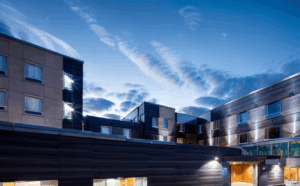Perth and Kinross Council has issued a definitive statement regarding the planning requirements for local hotels providing accommodation to asylum seekers, confirming that a ‘change of use’ planning permission is not typically required in such circumstances. This clarification comes in the wake of heightened public interest, partly spurred by a recent legal challenge in England.
A similar situation unfolded recently where Epping Forest District Council successfully obtained a temporary injunction to prevent The Bell Hotel in Essex from housing asylum seekers. The English council’s argument centred on the hotel’s alleged failure to notify them of a material change in its use, following a distressing incident in the town involving an asylum seeker. This prompted questions about how similar situations are handled within Perth and Kinross. Local Planning Framework Explained
However, the regulatory landscape in Scotland, and specifically Perth and Kinross, differs significantly. A spokesperson for Perth and Kinross Council explicitly stated: *“Hotels and hostels are exempt from the short-term lets licensing scheme.”* This means that these establishments do not fall under the same licensing regulations that apply to other forms of temporary accommodation. Furthermore, the council explained that the properties do not usually meet the criteria for Houses in Multiple Occupation (HMO) licensing in Scotland.
The distinction lies in the fundamental ‘structure and purpose’ of hotels. HMO licences are typically mandated for properties where three or more unrelated individuals reside and share essential facilities, such as kitchens or bathrooms, on a long-term basis, considering the accommodation their ‘main residence’.
The council spokesperson elaborated: *“Whilst people seeking asylum may be housed in a hotel for an extended period, it is classed as temporary accommodation and not their ‘main residence’ by the Home Office.”* This key differentiation is crucial. Individuals temporarily housed in hotels, including asylum seekers, are generally provided with individual bathroom facilities and meals, negating the requirement for shared kitchen spaces that would trigger HMO licensing. Their residency is considered transient by the Home Office, not permanent, which further exempts the hotels from needing a change of use planning application. Community Safety and Recent Demonstrations
Amidst these planning discussions, the Perth and Kinross Community Justice and Safety Partnership has reassured residents, stating there is *“no evidence”* to suggest that asylum seekers currently residing in the area pose a heightened risk to community safety. This statement aims to address concerns and promote accurate understanding within the local population.
The topic of asylum seeker accommodation has recently generated public demonstrations in Perth. Last Saturday, groups of protesters gathered outside the Radisson Blu Hotel, located adjacent to Perth Railway Station. These demonstrators voiced their anti-immigration sentiments, displaying banners and engaging in chants. In response, a counter-protest formed nearby, advocating for inclusivity and expressing support for refugees. Councillor Eric Drysdale, the deputy leader of Perth and Kinross Council, was among those participating in the counter-protest. He observed that many of the anti-immigration demonstrators were unfamiliar faces, suggesting to the BBC that he *“believed the majority had been ‘bussed in’.”* The counter-protesters chanted messages of welcome, holding placards that read “Refugees are welcome here” and “Perth against racism,” highlighting the diverse views present within the community regarding this sensitive issue.
The council’s clarification serves to demystify the legal and administrative aspects surrounding asylum seeker accommodation in Perth, underscoring the specific exemptions and definitions under Scottish planning and housing legislation.
A similar situation unfolded recently where Epping Forest District Council successfully obtained a temporary injunction to prevent The Bell Hotel in Essex from housing asylum seekers. The English council’s argument centred on the hotel’s alleged failure to notify them of a material change in its use, following a distressing incident in the town involving an asylum seeker. This prompted questions about how similar situations are handled within Perth and Kinross. Local Planning Framework Explained
However, the regulatory landscape in Scotland, and specifically Perth and Kinross, differs significantly. A spokesperson for Perth and Kinross Council explicitly stated: *“Hotels and hostels are exempt from the short-term lets licensing scheme.”* This means that these establishments do not fall under the same licensing regulations that apply to other forms of temporary accommodation. Furthermore, the council explained that the properties do not usually meet the criteria for Houses in Multiple Occupation (HMO) licensing in Scotland.
The distinction lies in the fundamental ‘structure and purpose’ of hotels. HMO licences are typically mandated for properties where three or more unrelated individuals reside and share essential facilities, such as kitchens or bathrooms, on a long-term basis, considering the accommodation their ‘main residence’.
The council spokesperson elaborated: *“Whilst people seeking asylum may be housed in a hotel for an extended period, it is classed as temporary accommodation and not their ‘main residence’ by the Home Office.”* This key differentiation is crucial. Individuals temporarily housed in hotels, including asylum seekers, are generally provided with individual bathroom facilities and meals, negating the requirement for shared kitchen spaces that would trigger HMO licensing. Their residency is considered transient by the Home Office, not permanent, which further exempts the hotels from needing a change of use planning application. Community Safety and Recent Demonstrations
Amidst these planning discussions, the Perth and Kinross Community Justice and Safety Partnership has reassured residents, stating there is *“no evidence”* to suggest that asylum seekers currently residing in the area pose a heightened risk to community safety. This statement aims to address concerns and promote accurate understanding within the local population.
The topic of asylum seeker accommodation has recently generated public demonstrations in Perth. Last Saturday, groups of protesters gathered outside the Radisson Blu Hotel, located adjacent to Perth Railway Station. These demonstrators voiced their anti-immigration sentiments, displaying banners and engaging in chants. In response, a counter-protest formed nearby, advocating for inclusivity and expressing support for refugees. Councillor Eric Drysdale, the deputy leader of Perth and Kinross Council, was among those participating in the counter-protest. He observed that many of the anti-immigration demonstrators were unfamiliar faces, suggesting to the BBC that he *“believed the majority had been ‘bussed in’.”* The counter-protesters chanted messages of welcome, holding placards that read “Refugees are welcome here” and “Perth against racism,” highlighting the diverse views present within the community regarding this sensitive issue.
The council’s clarification serves to demystify the legal and administrative aspects surrounding asylum seeker accommodation in Perth, underscoring the specific exemptions and definitions under Scottish planning and housing legislation.


